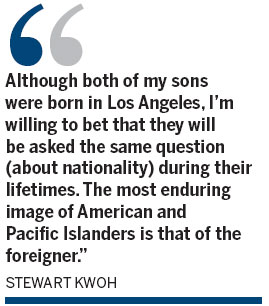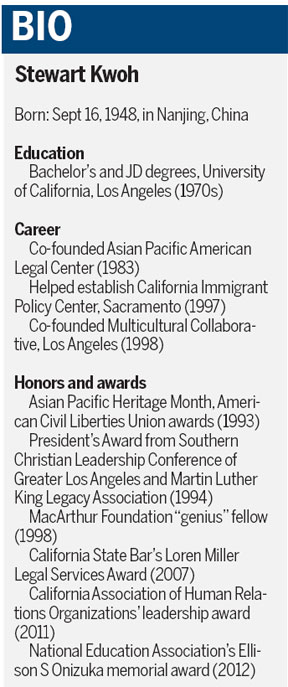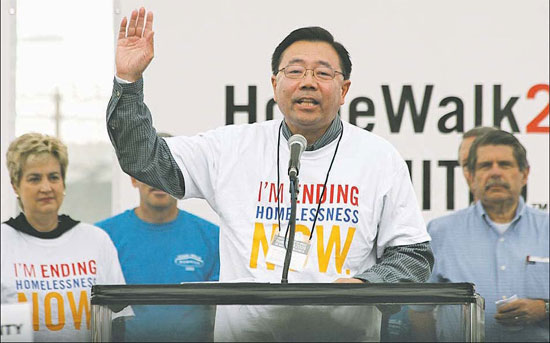Service for a cause
Updated: 2013-01-04 12:03
By Wang Jun (China Daily)
|
||||||||
|
Stewart Kwoh, here at a Los Angeles rally for the homeless in 2010, says his commitment to civil rights is rooted in his student activism and the moral example set by his parents. Provided to China Daily |
A zeal for justice has put Stewart Kwoh at the forefront of US civil-rights cases, but the lawyer maintains a quiet resolve instilled by his parents, China Daily's Wang Jun reports from Los Angeles.
Seventy-two Asians, overwhelmingly women, were stitching and ironing among piles of fabric and the whir of sewing machines when law enforcement officers raided the sweltering suburban Los Angeles apartment-turned-sweatshop, which was protected by barbed wire and armed guards.
That was in August 1995, and the forced laborers from Thailand were arrested along with the sweatshop owner. The garment workers - authorities later described them as slaves - had begun each day at 7 am, stopping for short lunch and dinner breaks before continuing until midnight or 1 am.
They were paid less than $1 an hour. About half of their earnings were deducted for expenses. Whatever they had left was used to buy food and other necessities from their captors at inflated prices.
It later emerged from court testimony that many of the workers were from poor families in rural parts of Thailand and came to Bangkok seeking work. There, they met middlemen who promised them good-paying jobs as seamstresses in the United States - up to $1,000 a month, with normal hours and weekends off.
The Thais traveled on US tourist visas, but upon arriving at the Los Angeles airport they were taken by associates of their employer to the apartment complex/sweatshop. They had to surrender their passports and valuables, and promise in writing to repay $5,000 in travel and other expenses.
The raid made news around the world, but lawyer Stewart Kwoh heard about it from his neighbor.
As the founder and executive director of the Asian Pacific American Legal Center, or APALC, Kwoh felt he had to take action on behalf of the sweatshop workers.
He began by petitioning immigration authorities to grant the Thai laborers legal residency in the United States. But Kwoh and the legal center's staff attorney, recent Harvard Law School graduate Julie Su, also questioned garment industry executives' claims of ignorance about substandard conditions in which much of the world's clothes are made.
The Thai workers, through civil-rights lawyers led by APALC, filed what is considered the first US federal lawsuit of its kind - challenging not only the practices of their own employer but those of the industry overall.
"Historically, laws supporting big business and consumers have been much more common than laws seeking to hold the practices of business accountable for injustice," according to APALC.

Soon after the suit was filed in early 1996, the legal-rights group was approached by 22 Latina workers from a front shop for the sweatshop raided in El Monte, a Los Angeles suburb. Some had been tasked with loading bundles of cut cloth for delivery to El Monte. They wanted to join the Thai workers' suit.
The Latinas were initially mistrustful of APALC's Asian-American staff. In their experience, they said, Asians tended to look down on Latinos.
At the same time, Kwoh was advised by many around him not to represent the Latina workers, and to focus solely on the Thais.
"I didn't listen to any of them and decided to work with the Latina workers. We had trilingual meetings in English, Thai and Spanish," recalled Kwoh, who describes himself as passionate about bridging communities.
By mid-1999, three years after the legal battle began, Kwoh and his team had won more than $4 million for the workers in settlements with major clothing manufacturers and retailers. California's Legislature passed a sweatshop-reform bill that makes top industry players ultimately responsible for garment workers' wages when contractors fail to pay.
Su, the young attorney from Harvard, was confirmed in September 2011 as California's labor commissioner and left APALC, where she had risen to the post of litigation director. In her current job, Su leads enforcement of the state's employment standards - including the kind that were violated in El Monte.
Kwoh, 64, remains with the organization he founded. Its mission is "to advocate for civil rights, provide legal services and education, and build coalitions to positively influence and impact Asian-Americans, Native Hawaiians and Pacific Islanders, and to create a more equitable and harmonious society".
Although highly regarded by civil-rights groups and the community at large, Kwoh said he has never counted his numerous awards. These include a prestigious MacArthur Foundation "genius" fellowship, Lawyer of the Year recognition by California Lawyer magazine, designation by another magazine as among the 100 most influential Asian-Americans of the 1990s, a Southern Christian Leadership award and a legal-services honor from the California State Bar.
'A noble cause'
Kwoh's enthusiasm for protecting civil liberties is rooted in his Christian upbringing and the influence of the civil-rights movement of the 1960s, when he was an undergraduate at UCLA.
Regarding the religious faith instilled by his parents, Kwoh considers Jesus an exemplar of "unselfish service for a noble cause".
His mother, Beulah Quo, was a veteran Hollywood actress whose career pushed open doors for Asian-Americans working in movies and television. Quo, who died in 2002, was the only daughter of an extremely poor Chinese immigrant family.
"She would scrub floors for 5 cents an hour to help make ends meet," her son said. "From a young age, she was taught the importance of hard work and education as a means to a better life."
On his father's side, Kwoh had a great-grandfather who was the first Presbyterian minister in China. His father, Edwin Kwoh, came to the US to study; he received a master's degree from Princeton Theological Seminary in New Jersey and later a doctorate in education from Columbia University.
Edwin Kwoh met the California-born Beulah at a Christian conference. She had graduated with Phi Beta Kappa honors from UC Berkeley and later earned a master's degree in sociology from the University of Chicago.
The couple married and moved to China, where they both taught at Ginling College in Nanjing. Stewart, their only son, was born in that city in 1948.
When the boy was 2 months old, the family moved to Oakland, California, where Edwin Kwoh ran a printing business. Two years later, the Kwohs returned to Los Angeles.
The future lawyer grew up in Echo Park and Silver Lake, multiracial, working-class sections of LA. Many of his neighbors attended the same church as Kwoh's parents.
In 1955, 32-year-old Beulah Quo was teaching sociology at Los Angeles Community College when she got her first movie role. She had heard that director Henry King was seeking a dialect coach for Hollywood starlet Jennifer Jones, who was to play a Chinese-European in the upcoming Love Is A Many-Splendored Thing, and applied. But King decided instead to cast Quo as an aunt of Jones' character.
For acting credits, she changed the spelling of her married surname to Q-U-O after some people remarked that K-W-O-H sounded like a radio station's call letters.
Stewart Kwoh and his sister, Mary Ellen, who is younger, wrote about their mother in Untold Civil Rights Stories, a 2009 book co-published by APALC and UCLA's Asian-American Studies Center. As suburban kids growing up in Southern California in the 1950s, the siblings noticed that people who looked like them were either absent from TV and movies, or relegated to minor, stereotyped roles as servants or shopkeepers.
"In fact, not only Asian-Americans, but African-Americans, Native Americans, Latinos and Chicanos were often invisible as well," they wrote.
To remedy this, Quo and her friends created the East-West Players, America's first Asian theatrical troupe, in her church's basement in 1965. "Auntie Beulah," as Quo was known, became a vital link in the Asian-American acting community.
Kwoh, who looked up to his mother as a hero, emulated her by helping establish an Asian students association at UCLA in 1969 while he was an undergraduate studying medicine.

The following year, US campuses were convulsed by student protests over bombings and ground incursions by American and US-backed South Vietnamese soldiers against Cambodia. Kwoh at the time was president of his university's Asian American Student Alliance, and he bailed out arrested protesters with the help of a relative who worked in the legal field. It was then he decided to go to law school once his pre-med studies were completed.
While studying law at UCLA from 1971 to 1974, Kwoh opened a legal-aid office aimed at low-income youth in Los Angeles' Chinatown. His partner was classmate Mike Eng, who is now a legislator in the California Assembly and the husband of US Representative Judy Chu, the first Chinese-American woman elected to Congress.
At the legal-aid office, Kwoh met and began dating volunteer Pat Lee, and they later married. The couple has two sons. After several years in private practice, Kwoh founded APALC in 1983. Also that year, he started working on the case of Vincent Chin.
In 1982, a Michigan auto-plant supervisor and his stepson, a laid-off auto worker, accosted Chin after a bachelor party for the 27-year-old's upcoming wedding. The men, both white, beat Chin with a baseball bat, and he died from his injuries four days later. They were accused of targeting Chin - ignoring or unaware that he was Chinese-American - as retaliation for the loss of US auto jobs to competition from Japan.
Several months later, the defendants were sentenced to three years' probation and fines of $3,000 each but no prison time.
Lily Chin was devastated by the death of her only son, just six months after her husband died and days before Vincent's wedding. She visited Los Angeles to speak at one of the many rallies around the US to decry the killing and demand justice. According to Kwoh, Mrs Chin fainted during her speech, and he and others revived her.
Later, as a guest at Kwoh's home, she told the lawyer: "Stewart, I don't want any mother to go through what I've experienced."
Kwoh and APALC, among others, helped persuade federal prosecutors to bring civil-rights charges against Chin's killers. By 1987, however, the legal fight was lost.
A federal jury in 1984 had convicted Ronald Ebens, the plant supervisor who administered the fatal blows with the bat while co-defendant Michael Nitz held the victim, of violating Chin's rights. Nitz, Ebens' stepson, was acquitted. Later, the Ebens conviction, which carried a 25-year prison sentence, was overturned on appeal due to what a higher court ruled was improper coaching of prosecution witnesses. A retrial ordered by the US Justice Department ended with Ebens cleared of all charges.
Despondent, Lily Chin moved back to her birthplace of Guangzhou, China, to stay with relatives. She died in 2002 after a return trip to the US for medical treatment.
Mother's activism, onstage
Like her son, Beulah Quo sought to raise public awareness of Vincent Chin's case and the racial tensions it represented, but in a different way.
According to Untold Civil Rights Stories, the actress contacted a playwright and director she knew and proposed they work with her to raise money for and produce a play to honor Vincent Chin.
The result, Carry the Tiger to the Mountain, premiered in July 1998 in West Virginia with Quo in the role of Lily Chin. It was later performed in Los Angeles by the East-West Players, which Quo had helped found.
In Uncommon Common Ground, a book on race relations in America that he co-wrote with David Mortimer, Kwoh recalls an encounter that illustrates the intractability of perception: "I was once asked by a white waitress where my family was from. I answered that my great-grandfather was a miner in New Mexico; my grandfather was a tailor in Oakland and Stockton, California, and that my mother was born in Stockton. The waitress interrupted me and asked, 'And how do you like your new country?'"
Kwoh added: "Although both of my sons were born in Los Angeles, I'm willing to bet that they will be asked the same question during their lifetimes. The most enduring image of American and Pacific Islanders is that of the foreigner."
The first influx of Chinese immigrants came in the 1940s to California. Since discriminatory immigration quotas were eliminated in 1965, the Asian-American population has grown dramatically - to more than 17 million as of a 2011 study.
The community grew 46 percent between 2000 and 2010, according to the US Census, a pace that exceeded that of any other racial group, including Latinos (43 percent) and African-Americans (15 percent).

 In Photos: 7.0-magnitude quake hits Sichuan
In Photos: 7.0-magnitude quake hits Sichuan
 Li Na on Time cover, makes influential 100 list
Li Na on Time cover, makes influential 100 list
 FBI releases photos of 2 Boston bombings suspects
FBI releases photos of 2 Boston bombings suspects
 World's wackiest hairstyles
World's wackiest hairstyles
 Sandstorms strike Northwest China
Sandstorms strike Northwest China
 Never-seen photos of Madonna on display
Never-seen photos of Madonna on display
 H7N9 outbreak linked to waterfowl migration
H7N9 outbreak linked to waterfowl migration
 Dozens feared dead in Texas plant blast
Dozens feared dead in Texas plant blast
Most Viewed
Editor's Picks

|

|

|

|

|

|
Today's Top News
Live report: 7.0-magnitude quake hits Sichuan, heavy casualties feared
Boston suspect cornered on boat
Cross-talk artist helps to spread the word
'Green' awareness levels drop in Beijing
Palace Museum spruces up
First couple on Time's list of most influential
H7N9 flu transmission studied
Trading channels 'need to broaden'
US Weekly

|

|








